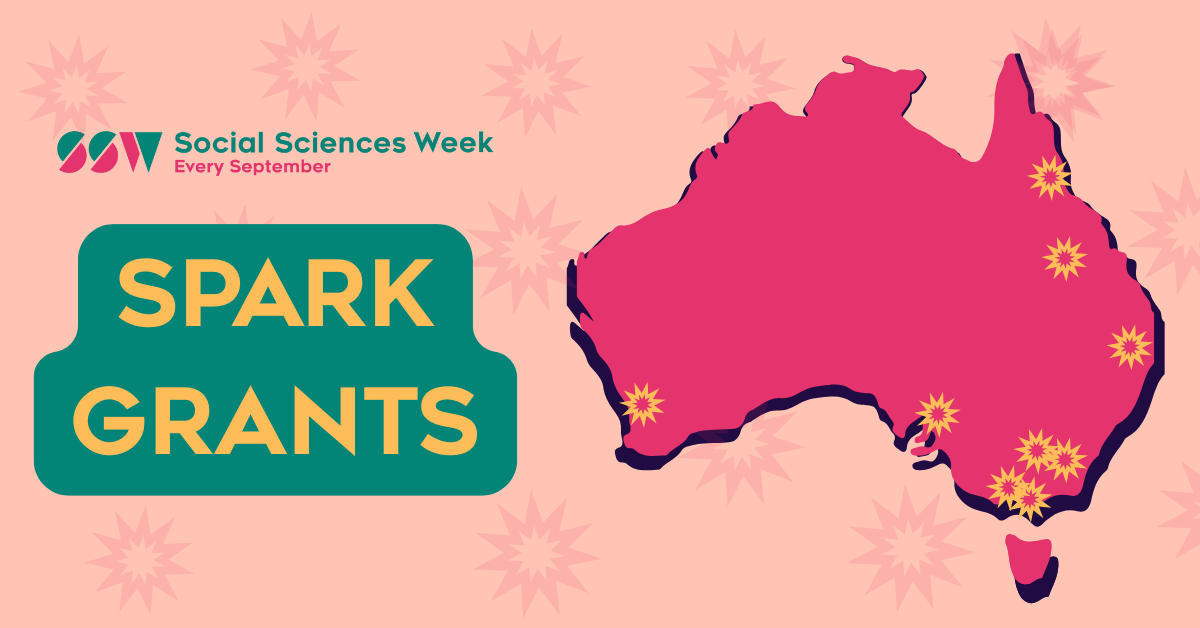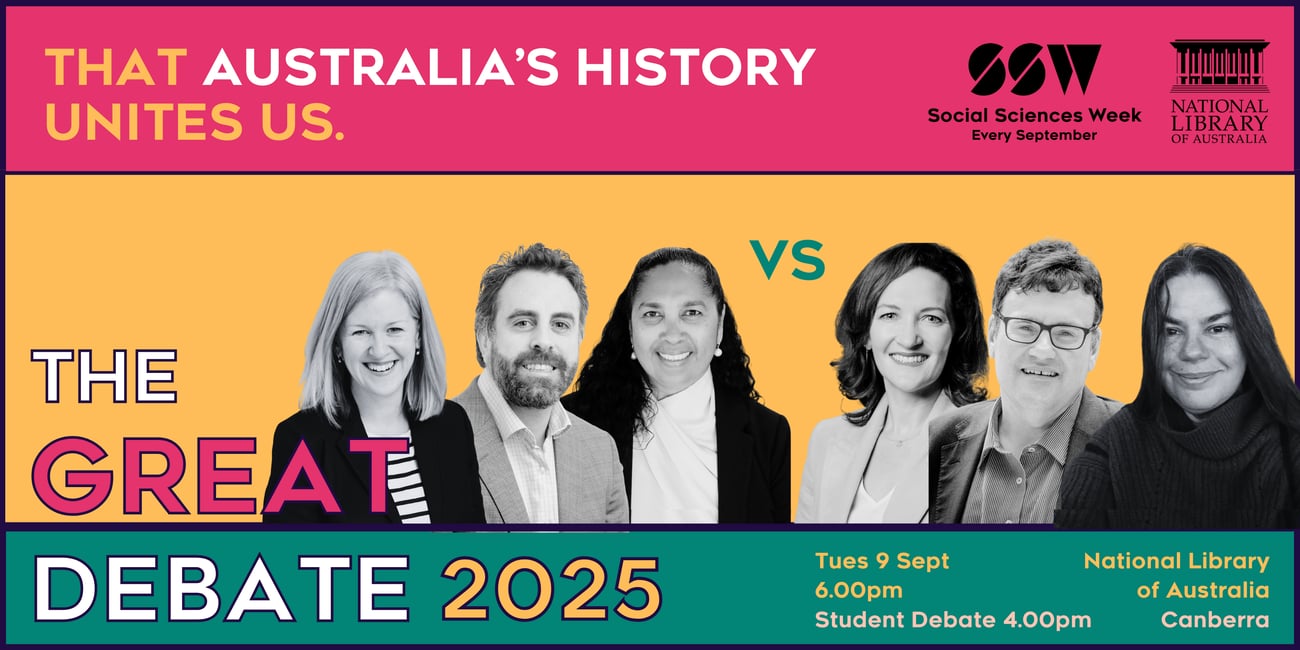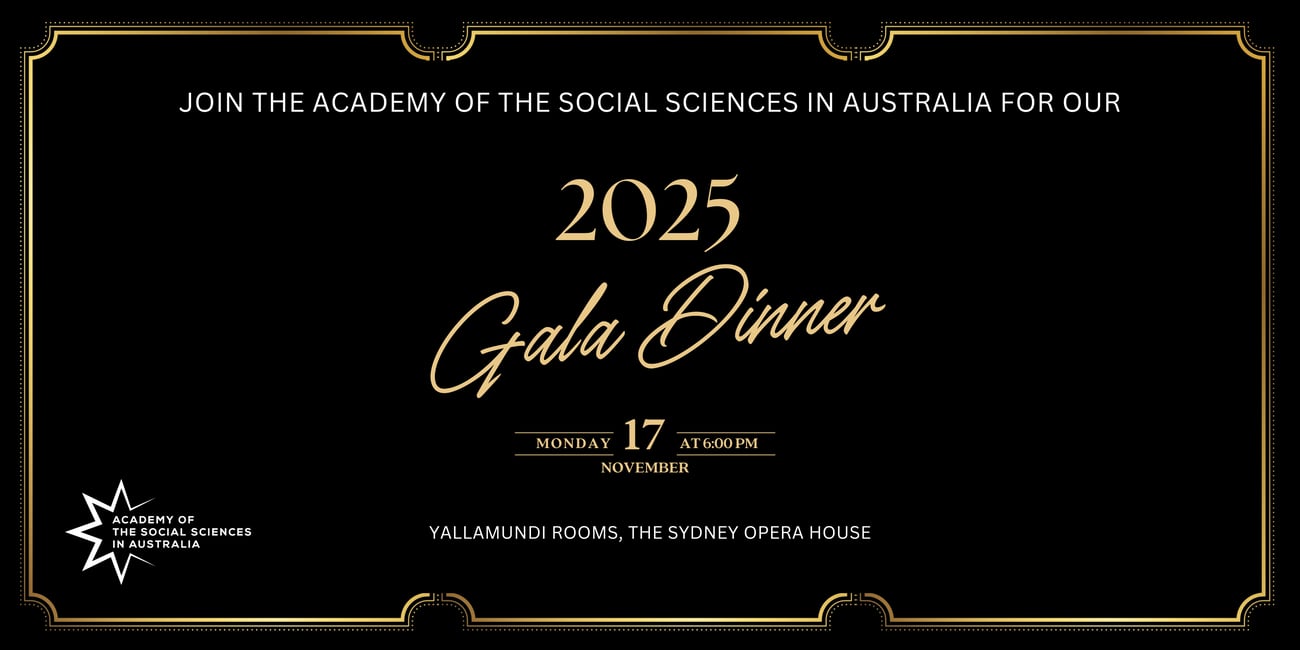|
|
|
Dear friend
This is a difficult time in the Australian higher education sector, with fluctuations in domestic and international student enrolments among the factors resulting in some major restructures within Australian universities. While no disciplines are completely immune, it is clear that Humanities, Arts and Social Science staff, units and centres continue to be particularly impacted in several institutions across the country.
These changes, and arising job losses, have enormous implications for the academic and professional staff who are directly affected, along with their colleagues, collaborators, students and families. To all those impacted — Fellows of the Academy and others— I extend my personal support and also do so on behalf of the Academy.
More generally, ongoing shifts and downsizing in the structure of the Social Sciences research and teaching workforce raise serious concerns about the future of Australia's national knowledge capabilities. Of particular concern are the reduced opportunities for early-career researchers in the university sector and maintaining the pipeline of highly trained PhD students in the Social Sciences.
For instance, how will Australia be able to ‘support healthy and thriving communities’ or’ ensure a secure and resilient nation’ — two of the five National Science and Research Priorities— if there are fewer psychologists, health economists, sociologists, public policy scholars and historians employed in Australia's universities with capacity to understand and advise decision-makers on the complex social, economic and cultural forces at play?
Australia’s research capacity to solve key social and environmental challenges — and most importantly to ensure that all Australians, including First Nations communities, can live healthy, equitable and productive lives— depends on the input from the Social Sciences. Our research is core to the cross-disciplinary approach that must guide how we tackle and find solutions for the big and small issues that determine how Australians, now and in future generations, will prosper.
Yet public recognition of the social value of the Social Sciences and the Humanities has declined in Australia and elsewhere globally in recent years. The focus of the Academy on furthering the integrity and capacity of the Social Sciences is an exercise in rebuilding public and government trust in the value and importance of the work we do in all aspects of the daily experiences of Australians and in governmental policies and practices.
To that end, the Academy has commenced a major update of its landmark 2021 State of the Social Sciences report for release in early 2026. The updated report will delve deeply into the strengths, gaps and opportunities for the Social Sciences at disciplinary level, including student enrolments and staffing numbers. It will consider how much teaching, research and translational capacity Australia has in the Social Sciences, how this has changed over time, and what skills, resources, infrastructure and policy settings might conceivably be required to address the major social challenges today and in the medium term.
The report will provide a strong base of evidence with which the Academy can speak authoritatively and from a position of trust with our institutional and government leaders about the Social Science teaching and research capacity that is required to secure Australia's future.
Of course, there are other ways the Academy acts on its mission to champion the Social Sciences. I have recently signed an Open Letter to the Prime Minister requesting the repeal of the Job-Ready Graduates (JRG) Package that has had such an inequitable impact on students of the Humanities and Social Sciences in the BA and other degrees. This letter was initiated by the Australian Historical Association and its President, Professor Michelle Arrow, FASSA and an online petition has been created which readers may wish to sign.
Ongoing activities by the Academy to advocate for the value of the Social Sciences includes working with the panel leading the Strategic Examination of Research and Development (SERD), with Fellows advising on the range of issues under consideration to expand and enhance Australia's research and innovation system.
Upcoming meetings this month include one with the newly-established Australian Tertiary Education Commission (ATEC) to discuss the critical role of Social Science education and research in universities. The Academy’s Board will be hearing from ARC CEO Professor Üte Roessner FAA about how changes to its funding schemes may impact and create opportunities for Social Sciences researchers. The Policy Committee is meeting with Australian Chief Scientist Professor Tony Haymet FTSE to explore the intersections of the Social Sciences with their agencies and offices.
The Academy continues to collaborate with likeminded institutions to convene conversations about nationally important issues. Last week in Melbourne, the Academy partnered with the Melbourne Institute of Applied Economic and Social Research and CEDA to convene a forum where journalist Alan Kohler moderated a panel of expert speakers who shared evidence and ideas to boost Australia's productivity.
And the following day in Canberra, the Academy brought together over 50 researchers and senior officials from a variety of Government departments and agencies to discuss ways in which integrated public data could be more effectively utilised to inform evidence-based policy.
There is much to celebrate in the outstanding achievements too of our Fellows and the Social Sciences more generally, and Social Sciences Week (8-14 Sept) is growing in the scope of its activities. The Academy’s long-standing grant programs for researchers in Australia and our region, and our the new Seriously Social schools program, are just some of the ways in which our Academy is seeking to advance the standing of the Social Sciences. We are privileged to do so with the support of our Fellows and each of our friends and collaborators.
Kate Darian-Smith
President |
|
|
|
|
|
|
|
Policy Roundtable
Unlocking value: Better use of integrated government data for evidence-based policy |
|
On 30 July 2025, the Academy of the Social Sciences in Australia and Professor Bob Breunig FASSA, Professor Adrian Barnett FASSA, Professor Philip Clarke FASSA and Professor Henry Cutler jointly convened a policy roundtable exploring how integrated government data can support more effective, efficient policy development and the barriers to use and equitable access.
The roundtable brought together more than 50 researchers, data custodians, policymakers and funders, providing a unique opportunity to share cross-disciplinary and cross-sectorial perspectives and co-design a pathway towards sustainable, mutually beneficial models for funding and capability uplift.
Presenters included Dr David Gruen FASSA, The Hon Dr Andrew Leigh MP, FASSA, Professor Anushka Patel FAHMS, and Professor Beth Webster FASSA.
The Academy will publish a comprehensive summary of the discussion and outcomes in coming weeks.
|
|
|
|
|
|
|
Above left: Professor Adrian Barnett FASSA, Academy CEO Dr Chris Hatherly, Professor Bob Breunig FASSA, Professor Henry Cutler, and Professor Philip Clarke FASSA. Above right: the Policy Roundtable in progress. |
|
|
|
|
|
Productivity in the spotlight at expert Flash Forum
On Tuesday 29 July, 2025, the Academy partnered with The Melbourne Institute of Applied Social and Economic Research and CEDA to convene 10 leading experts for a rapid-fire forum focused on immediate priorities for boosting Australia’s productivity.
Read more and watch a video recording of the session here. |
|
|
|
|
|
2026 Fellowship Election Nominations OPEN
2026 Fellowship Election Nominations are now open, closing 26 November.
Visit the Academy webpage for more information.
Log into the Fellows Portal to submit a nomination. |
|
|
|
|
|
|
|
|
|
Professor Margaret Davies and Professor Marilyn Lake AO have been elected as International Fellows of The British Academy.
Read more |
|
|
|
|
|
Professor Bob Breunig has been elected as President of the Economic Society of Australia, while Dr Ken Henry has been presented with the 2025 Distinguished Public Policy Fellow Award and Professor Mark Wooden has been presented with the 2025 Distinguished Fellow Award.
Read more.
|
|
|
|
|
|
Professor Graeme Davison AO, FASSA, FAHA and Professor Alan Woodland FASSA are celebrating 40 years of Fellowship this year.
Join the Academy in Sydney for our Gala Dinner on 17 November where you can hear from Graeme and Alan, and help us celebrate this important milestone. |
|
|
|
|
|
|
|
|
|
|
A wide range of grants and funding rounds are now open. Don’t miss exploring the opportunities below. |
|
|
|
|
|
|
Rechnitz Memorial Award – closes 15 August
The annual Rechnitz Award is intended to recognise excellence in research leadership and advancement of knowledge of Indigenous society, culture and language. Nominations must be supported by two Fellows of either the Academy of the Social Sciences in Australia or the Australian Academy of Humanities.
Learn how to apply.
|
|
|
|
Gough Whitlam and Malcolm Fraser Chair in Australia Studies
Applications for the Gough Whitlam and Malcolm Fraser Chair in Australian Studies at Harvard University in 2026-27 are now open; closing 15 October.
This is a prestigious visiting Chair that has been held by more than a dozen Fellows of the Academy over time; most recently Professors Megan Davis (2024-25), Katie Holmes (2023-24) and Warwick Anderson (2018-19).
Find out more and apply here.
|
|
|
|
|
|
|
|
|
|
|
Social Sciences Week |
 |
|
|
|
2025 Spark Grant Recipients |
|
Ten Social Sciences Week events across Australia have been selected to receive the Academy’s inaugural Spark Grants.
Read more. |
|
Register your event |
|
With just five weeks until Social Sciences Week, it is time to register your event on the official website here.
New events for 2025 include a social sciences quiz in the Queensland outback, an online cryptocrime seminar, an outdoor therapy lecture series and a participatory migration workshop.
Don’t miss this year’s Great Debate at the National Library of Australia featuring Academy Fellows Professor Jakelin Troy, Professor Frank Bongiorno, Professor Michelle Arrow and Professor Dan Woodman tackling the question of “whether Australia’s history unites us”.
Book online now. |
|
|
 |
|
|
|
|
|
|
|
|
|
Featured events from Social Sciences Week principal sponsor RMIT |
|
Whet your appetite for Social Sciences Week with a sneak peek at some of RMIT’s featured events. Click through to the #SSW2025 events page for the full list of events on offer from our principal sponsor. |
|
|
Open-Source Intelligence: Tools and Tips for Getting Started
Join experienced fact checkers for an interactive online workshop covering the basics of online verification and open-source intelligence (OSINT) techniques. Through this workshop you’ll pick up tools and tips to help you spot false information on social media.
Find out more. |
|
|
|
|
Kummargii Yulendji Symposium by Informit
We are thrilled to invite you to Kummargii Yulendji Symposium, an event focusing on how we describe, apply, and amplify First Peoples’ Knowledges and publications. This symposium offers a forum for the movement and communities that are Indigenising the research, libraries, and publishing sector, presenting many perspectives towards re-visioning colonial structures and systems.
Find out more. |
|
|
|
Research/practice collaborations on dance and Down syndrome
This Social Sciences Week event spotlights a bold RMIT collaboration between researchers, artists, and dancers with and without Down syndrome. Together, they asked: What happens when we centre the lived experience of dancers with Down syndrome—not as an add-on, but as the heart of dance-making and research? You’ll hear from the team behind Dancekin, a new Melbourne-based collective shaped by this research.
Find out more.
|
|
|
|
|
|
|
Events |
 |
|
|
|
Academy Gala Dinner |
|
|
|
Early bird registrations are now open for the Academy’s Gala Dinner. Secure your tickets early to receive a discount on ticket price.
Academy Gala Dinner
Monday 17 November, 6.00PM
Yallamundi Rooms, The Sydney Opera House
Early bird registrations close on 12 September.
|
|
|
|
|
|
|
|
|
Read, Watch, Listen |
|
Every month we collate news, publications and events featuring Fellows and the social sciences for this newsletter. Please send any items for inclusion to info@socialsciences.org.au |
|
Read |
|
Naturalising climate change
Epistemic preparedness
-
Featuring Fellow Warwick Andersen as lead author and developed from an Academy workshop, this paper published in BMJ Global Health considers how epidemic and pandemic preparedness could be improved with consideration of epistemic, conceptual and cognitive factors. Read it here.
|
|
|
|
Watch |
|
Australians need the ‘slip, slop, slap’ of brain health
Academy Fellow Professor Henry Brodaty AO, global dementia expert, clinician and policy advisor delivered a powerful address to the National Press Club of Australia – sharing his latest insights in dementia research and the urgent need for investment in prevention and risk reduction.
“Over four decades, we’ve moved from hopelessness to hope, from stigma to science. I’m proud to have been part of this transformation,” said Professor Brodaty.
Professor Brodaty’s thought-provoking address to the National Press Club is now available to view online.
|
|
|
|
Listen |
|
From Con the Fruiterer to East West 101 - the changing face of Australian TV
Australia is a multicultural country, but up until recently, when you turned on the telly, you wouldn't know it. So what role has TV played in Australia's diverse communities, on screen, behind the scenes and in the living rooms across this country, over the past 70 years?
Recorded by ABC Radio National as part of the launch of Academy President Professor Kate Darian-Smith’s book Migrants, Television and Australian Stories: A New History.
Listen here.
|
|
|
|
|
|
|
The Academy strives to keep you informed, including sharing sad news of Fellows’ passing.
Notices are posted on Linkedin and in our monthly newsletter, though delays may occur if we receive information after publication. Please help by sharing the Vale section with your networks where appropriate and notifying us of any Fellow’s passing. We appreciate your understanding. |
|
|
|
|
|
|
|
|
|
|
The Academy of the Social Sciences in Australia acknowledges Aboriginal and Torres Strait Islander peoples as the First Peoples of Australia.
We acknowledge and pay our respects to the traditional owners of the land on which our national office is located, the Ngunnawal and Ngambri peoples, and
to their elders past and present. |
|
|
|
|
|
|